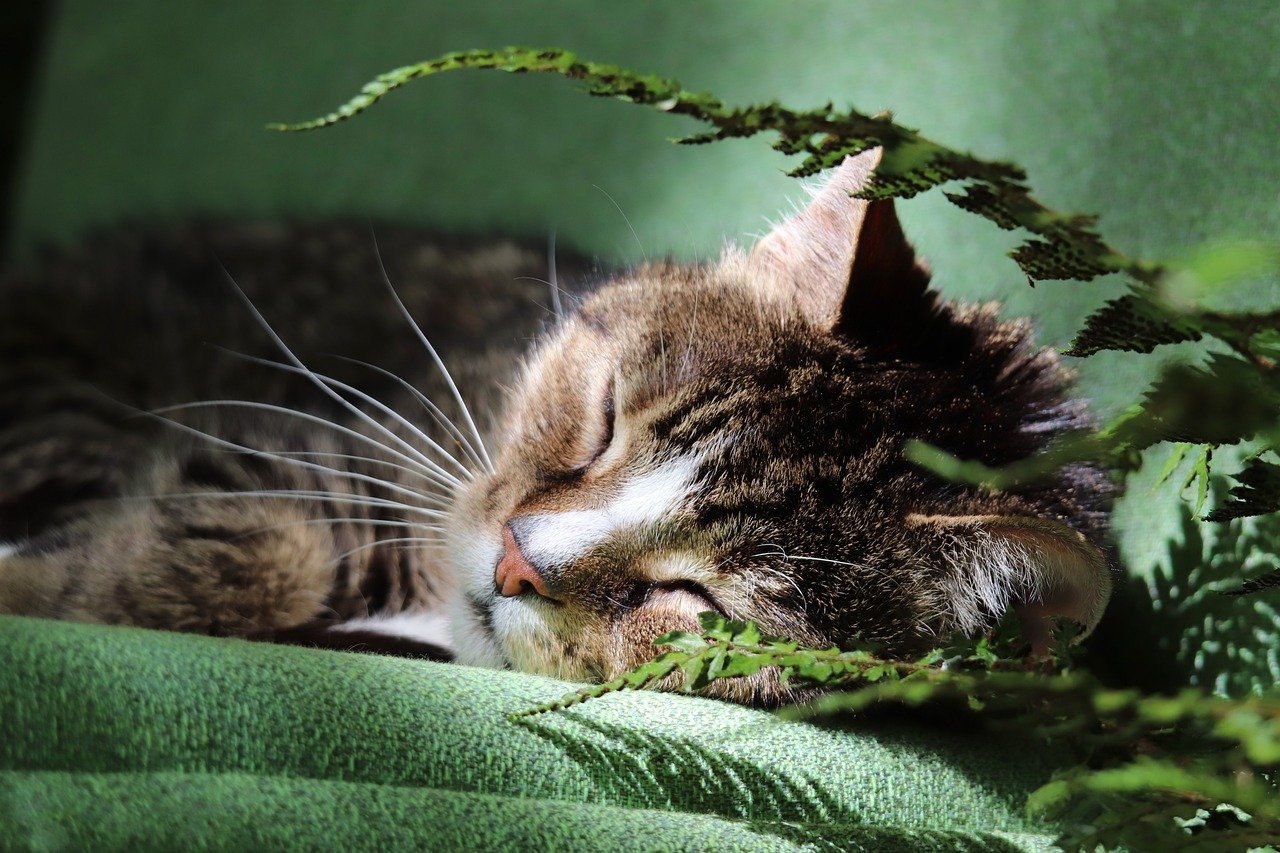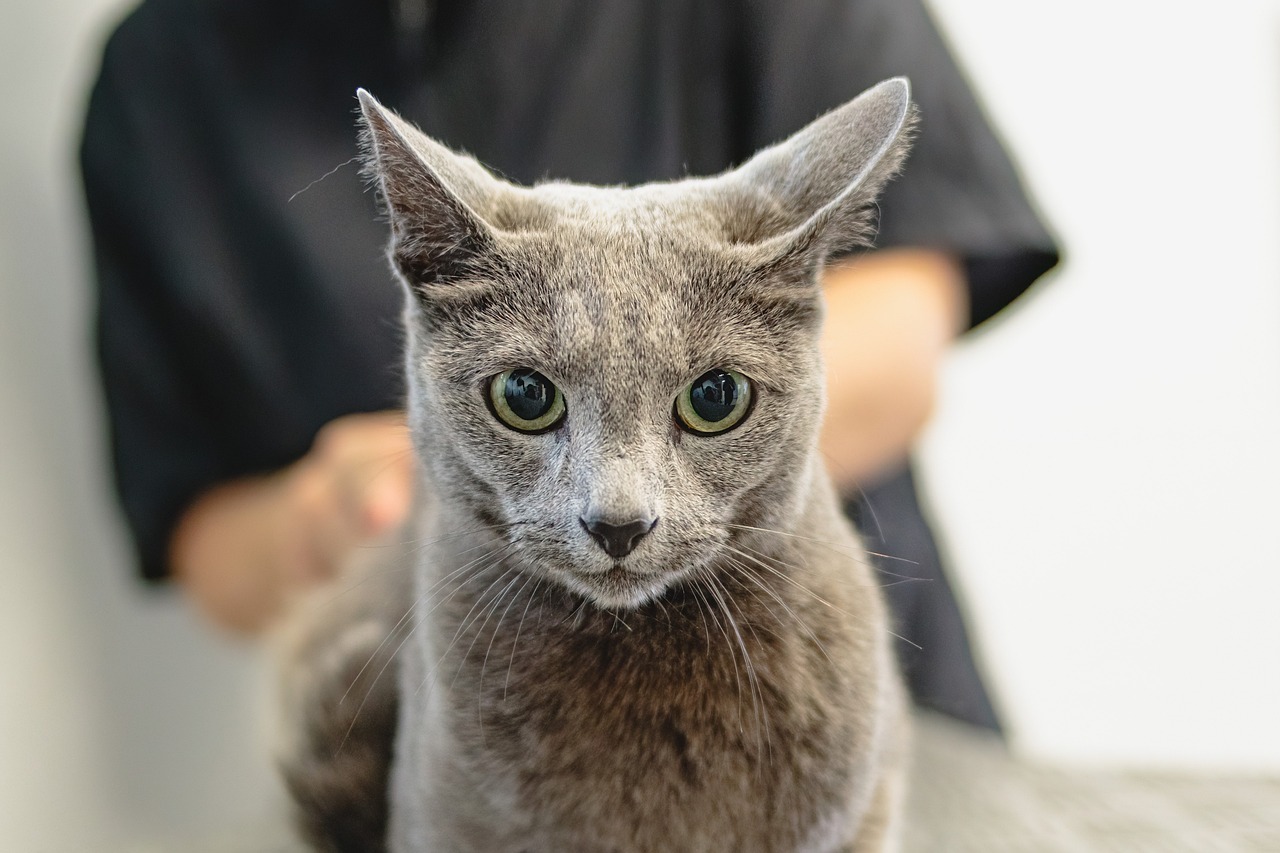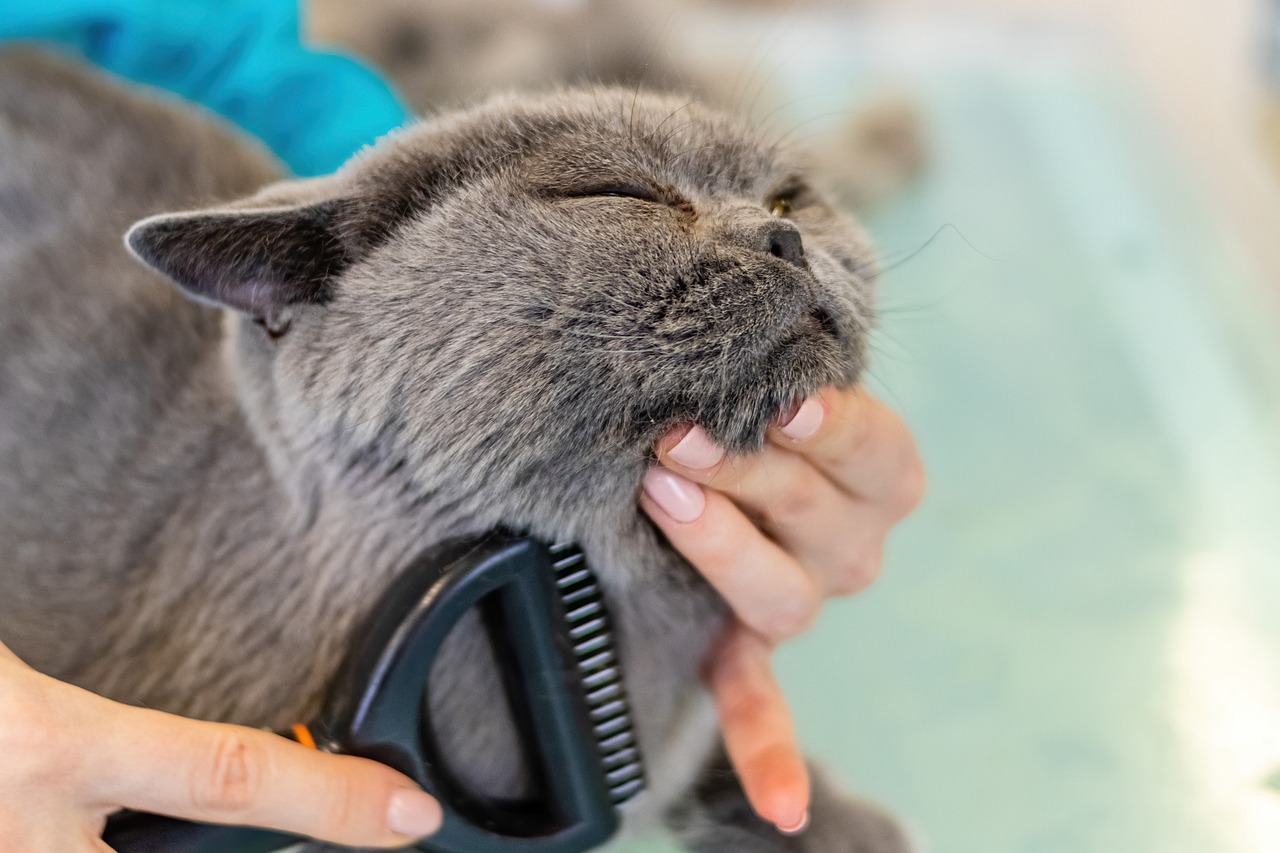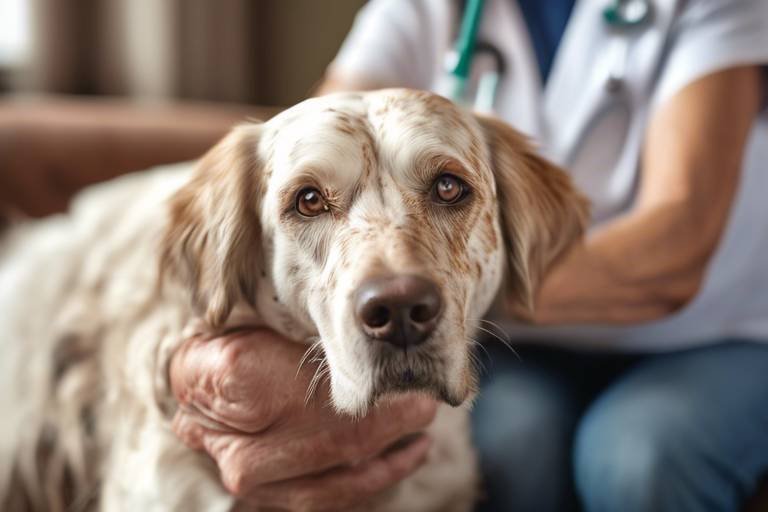How to Care for a Senior Pet with Allergies
As our furry friends age, they become more vulnerable to various health issues, including allergies. Caring for a senior pet with allergies requires a special touch, a blend of compassion and knowledge. Imagine your pet as a wise old sage, who has seen it all but now faces new challenges. Their immune systems are not as robust as they once were, making them more susceptible to allergens that may not have bothered them in their younger years. This article provides essential tips and insights on managing allergies in senior pets, ensuring their comfort and health while enhancing the bond between you and your furry companion.
Allergies in senior pets can stem from various sources. Common allergens include pollen, dust mites, mold, and even certain foods. As pets age, their immune systems undergo changes, which can lead to increased sensitivity to these allergens. Just like humans, pets can develop new allergies over time. This means that even if your pet has never had an allergy before, they could suddenly start showing symptoms. Understanding these changes is crucial for providing the best care possible.
Recognizing the signs of allergies in senior pets is crucial for early intervention. Common symptoms include:
- Itching: Constant scratching or biting at the skin.
- Sneezing: Frequent sneezing or nasal discharge.
- Skin Irritations: Redness, swelling, or lesions on the skin.
By being vigilant and observing your pet's behavior, you can catch these symptoms early and seek the appropriate treatment.
Skin allergies can manifest in various ways, such as redness, swelling, or lesions. These symptoms can be distressing for your pet, leading to discomfort and anxiety. If you notice your pet scratching excessively or developing hot spots, it’s time to consult your veterinarian. Understanding these symptoms can aid in timely interventions and treatments to alleviate your pet's discomfort.
Senior pets may develop ear infections due to allergies, which can be quite painful. Look for signs like an unpleasant odor, discharge, or excessive scratching at the ears. Prompt veterinary care is essential, as untreated ear infections can lead to more serious health issues.
Allergies can also lead to gastrointestinal problems in pets. Symptoms such as vomiting and diarrhea may indicate that your pet is reacting to something in their diet or environment. Managing these reactions effectively often involves dietary adjustments and possibly medication, so it’s vital to keep a close eye on your pet’s eating habits and stool consistency.
Allergies can affect your pet's behavior, leading to increased irritability or lethargy. If your normally playful pup seems withdrawn or your cat is less interested in cuddling, allergies could be the culprit. Observing these changes can help you determine whether allergies are the cause and guide you in seeking appropriate treatment.
A clean and controlled environment can significantly reduce allergy triggers for your senior pet. Here are some tips to maintain a hypoallergenic home:
Establishing a consistent cleaning routine can minimize dust, pollen, and other allergens in your home. Regular vacuuming, dusting, and washing your pet's bedding can create a safer space for your senior pet. Consider using air purifiers to help filter out allergens from the air.
Selecting hypoallergenic bedding can greatly improve your pet's comfort. Materials such as cotton or microfiber are less likely to trigger allergic reactions. Make sure to wash bedding frequently to keep it free from dust mites and other allergens.
Regular check-ups with your veterinarian are essential for managing your senior pet's allergies effectively. Your vet can provide invaluable guidance and develop a treatment plan tailored to your pet's specific needs.
Understanding your pet's specific allergens through testing can lead to targeted treatments. Allergy tests can help identify what your pet is reacting to, allowing for a more focused approach to management.
Explore various medication and treatment options available for managing allergies in senior pets. These may include antihistamines, corticosteroids, or even immunotherapy, depending on the severity of your pet's allergies. Ensuring they receive the best care possible for their condition is crucial to maintaining their quality of life.
Q: Can senior pets develop allergies suddenly?
A: Yes, senior pets can develop allergies at any age, even if they have never had them before.
Q: What should I do if I suspect my pet has allergies?
A: Consult your veterinarian for a thorough examination and appropriate testing.
Q: Are there specific diets for pets with allergies?
A: Yes, hypoallergenic diets are available and can be beneficial for pets with food allergies.
Q: How often should I clean my home for my allergic pet?
A: Regular cleaning is essential; aim for at least once a week, with more frequent washing of pet bedding.

Understanding Allergies in Senior Pets
As our furry companions age, their bodies undergo various changes, making them more vulnerable to a range of health issues, including allergies. Just like humans, pets can develop allergies at any stage of their lives, but senior pets often face heightened risks. This is primarily due to the gradual decline in their immune system efficiency, which can lead to a greater susceptibility to allergens that they may have previously tolerated.
Common allergens for senior pets include environmental factors such as pollen, dust mites, and mold, as well as food ingredients like grains, dairy, and certain proteins. With age, the body’s ability to combat these allergens diminishes, which can result in chronic conditions that affect their quality of life. Understanding these allergens is crucial for pet owners who want to keep their aging pets comfortable and healthy.
Moreover, senior pets might not only react to new allergens but also exhibit increased sensitivity to allergens they had previously encountered without issue. For instance, a senior dog that has always enjoyed chicken might suddenly develop a reaction, leading to symptoms like itching or gastrointestinal distress. This unpredictability can be alarming and requires vigilant observation from pet owners.
In addition to environmental and food allergens, it’s essential to recognize that other factors can exacerbate allergic reactions in senior pets. Stress, hormonal changes, and even seasonal variations can contribute to the severity of allergies. Therefore, creating a comprehensive understanding of your pet’s specific triggers is vital.
To help you get a clearer picture of how allergies can manifest in senior pets, here’s a brief overview of common allergens:
| Type of Allergen | Examples | Effects on Pets |
|---|---|---|
| Environmental | Pollen, dust mites, mold | Itching, sneezing, skin irritations |
| Food | Grains, dairy, certain proteins | Vomiting, diarrhea, itching |
| Flea Allergies | Flea saliva | Severe itching, hair loss |
Understanding these allergens is just the first step. As a responsible pet owner, you should be proactive in identifying and managing your senior pet's allergies. This not only ensures their comfort but also strengthens the bond between you and your beloved companion. After all, a happy pet means a happy home!

Identifying Allergy Symptoms
Recognizing the signs of allergies in senior pets is crucial for ensuring their comfort and well-being. Just like us, our furry friends can experience a range of allergic reactions that can affect their quality of life. Imagine your beloved dog or cat, usually full of energy, suddenly becoming withdrawn or irritable. This change could be a telltale sign that they are struggling with allergies. So, what exactly should you look for?
Common symptoms of allergies in senior pets include itching, sneezing, and skin irritations. These symptoms can manifest in various ways, making it essential to stay vigilant. For instance, if you notice your pet scratching excessively or chewing on their paws, it could indicate an allergic reaction. Additionally, sneezing and coughing, especially if they seem persistent, can point towards environmental allergens such as pollen or dust.
Skin allergies are particularly common and can manifest as redness, swelling, or even lesions on your pet's skin. These symptoms can be incredibly uncomfortable for your furry friend. If you observe any unusual patches or changes in their skin, it's time to take action. Early intervention is key! You might want to consider keeping a diary of your pet's symptoms and any potential triggers you notice, which can be incredibly helpful when discussing their condition with your veterinarian.
Another area to keep an eye on is your pet's ears. Senior pets are particularly susceptible to ear infections, which can be exacerbated by allergies. If you detect any unpleasant odors or see discharge from their ears, it's imperative to consult your veterinarian promptly. Ear infections can lead to more serious complications if left untreated, so don’t hesitate to seek help!
Allergies can also wreak havoc on your pet's digestive system. Symptoms such as vomiting and diarrhea can indicate that your pet is having an allergic reaction to something they’ve eaten or come into contact with. If you notice these symptoms, it’s essential to monitor your pet closely. Keeping track of their diet and any changes in their eating habits can provide valuable insights for your vet.
Lastly, allergies can lead to noticeable changes in your pet's behavior. You may find that your once-playful companion is now more irritable or lethargic. These shifts can be frustrating for both you and your pet, but understanding that allergies could be the underlying cause can help you address the issue more effectively. Pay close attention to your pet's routine and mood; sometimes, the smallest changes can signal a bigger problem.
In summary, being aware of these allergy symptoms is vital for the health and happiness of your senior pet. By staying vigilant and proactive, you can help ensure they lead a comfortable life, free from the discomfort that allergies can bring. If you suspect your pet might be suffering from allergies, don’t hesitate to consult your veterinarian for a thorough evaluation and tailored treatment plan.
- What are the most common allergens for senior pets? Common allergens include pollen, dust mites, certain foods, and flea saliva.
- How can I tell if my pet has allergies? Look for symptoms like itching, sneezing, skin irritations, and changes in behavior.
- Are there specific treatments for senior pets with allergies? Yes, treatments may include medications, dietary changes, and environmental adjustments.
- When should I consult a veterinarian? If you notice persistent symptoms or behavioral changes, it's best to seek professional advice.
Skin Reactions
When it comes to our beloved senior pets, can be one of the most distressing signs of allergies. As they age, their skin becomes thinner and more sensitive, making them more vulnerable to various allergens. These reactions can manifest in several ways, and being vigilant about them is crucial for your pet's well-being. Common symptoms include redness, swelling, and even lesions on the skin. If you notice your furry friend scratching more than usual or licking certain areas obsessively, it might be time to investigate further.
Skin allergies in senior pets can be triggered by a variety of factors, including environmental allergens like pollen, dirt, and dust mites, as well as food allergies. It’s essential to keep an eye out for these symptoms, as they can lead to more severe issues if left untreated. For instance, persistent scratching can result in open wounds or infections, which can complicate treatment and prolong your pet's discomfort. Therefore, timely intervention is key.
To help you better understand the types of skin reactions your senior pet may experience, here’s a quick overview:
| Type of Reaction | Symptoms | Possible Causes |
|---|---|---|
| Redness | Inflamed patches on the skin | Environmental allergens, irritants |
| Swelling | Localized swelling or bumps | Insect bites, food allergies |
| Lesions | Open sores or scabs | Infections, prolonged scratching |
It's also important to remember that not all skin reactions are the same. Some pets may experience mild irritation, while others may have severe allergic reactions that require immediate veterinary attention. If you notice any unusual changes in your pet's skin, it’s best to consult with your veterinarian to determine the underlying cause and appropriate treatment.
In conclusion, being proactive about your senior pet's skin health can significantly enhance their quality of life. Regular grooming sessions can help you spot any changes early, while also providing your pet with some much-needed TLC. After all, a happy pet is a healthy pet!
- What should I do if my pet has a skin reaction? - If you notice any signs of skin irritation, consult your veterinarian for a proper diagnosis and treatment plan.
- Can I use human allergy medications on my pet? - No, always consult your veterinarian before administering any medication to your pet, as human medications can be harmful to animals.
- How can I prevent skin allergies in my senior pet? - Regular grooming, a clean environment, and a balanced diet can help reduce the risk of skin allergies.
Ear Infections
As our beloved pets age, their bodies undergo various changes, and one common issue that arises is the susceptibility to . Allergies can play a significant role in the development of these infections, making it crucial for pet owners to be vigilant. If you notice your senior pet frequently shaking their head, scratching at their ears, or showing signs of discomfort, it might be time to investigate further. These symptoms can indicate an underlying ear infection, often exacerbated by allergies.
Ear infections in senior pets can stem from a variety of causes, but when allergies are involved, it typically leads to inflammation and excess moisture in the ear canal. This creates a perfect breeding ground for bacteria and yeast, resulting in infections. It's essential to recognize the signs early, as untreated ear infections can lead to more severe health issues, including hearing loss. The following symptoms are often associated with ear infections:
- Odor: A foul smell emanating from the ear can be a telltale sign of infection.
- Discharge: Any unusual discharge, whether it be brown, yellow, or bloody, should be addressed immediately.
- Redness and Swelling: Inflammation in the ear canal can be observed as redness or swelling.
- Pain or Discomfort: Your pet may show signs of pain when you touch their ears or may avoid having their ears handled.
Prompt veterinary care is critical if you suspect your pet has an ear infection. Your veterinarian will likely perform a thorough examination and may take samples to determine the specific cause of the infection. Treatment can vary based on the severity and underlying causes, but it often includes:
| Treatment Options | Description |
|---|---|
| Cleaning | Professional cleaning of the ear canal to remove debris and discharge. |
| Medications | Prescription antibiotics or antifungal medications to treat the infection. |
| Anti-Inflammatories | Medication to reduce inflammation and relieve pain. |
In addition to medical treatment, maintaining a clean and dry environment for your pet is essential to prevent future infections. Regularly check your pet's ears for any signs of irritation or infection, especially if they have a history of allergies. Keeping their ears clean and dry can make a world of difference in their comfort and health.
Remember, early detection and treatment are vital for managing ear infections in senior pets. By staying observant and proactive, you can help your furry friend enjoy a happier, healthier life.
Q: How can I prevent ear infections in my senior pet?
A: Regularly clean your pet's ears with vet-recommended solutions, keep them dry, and monitor for allergy symptoms.
Q: Can ear infections be a sign of something more serious?
A: Yes, persistent ear infections can indicate underlying health issues, so it's essential to consult your veterinarian.
Q: What should I do if my pet resists having their ears examined?
A: Try to make the experience positive with treats and gentle handling. If they remain resistant, consult your vet for advice.
Gastrointestinal Issues
Allergies in senior pets can manifest in various ways, and one of the most concerning is through gastrointestinal issues. As our furry friends age, their digestive systems can become more sensitive, making them prone to adverse reactions from certain foods or environmental allergens. It's crucial for pet owners to be vigilant about any changes in their pet's eating habits or bathroom routines. Common symptoms of gastrointestinal issues due to allergies may include vomiting, diarrhea, and even loss of appetite. These signs can be alarming, and they often indicate that something is amiss in your pet's body.
When a senior pet experiences gastrointestinal distress, it can lead to discomfort and a decrease in their overall quality of life. For instance, if your pet is frequently vomiting, it may be a sign that they are reacting to a specific ingredient in their diet. Similarly, diarrhea can occur as a result of food intolerances or allergies, leading to dehydration and further health complications if not addressed promptly. It's essential to monitor your pet closely and keep track of any changes in their behavior or physical condition.
To effectively manage gastrointestinal issues related to allergies, consider the following strategies:
- Dietary Adjustments: Switching to a hypoallergenic diet can help eliminate potential allergens. Look for foods that contain limited ingredients and are specifically formulated for sensitive stomachs.
- Gradual Transition: If you decide to change your pet's diet, do so gradually over a week to avoid upsetting their stomach further. Mix the new food with their current food, slowly increasing the new food's proportion.
- Hydration: Ensure that your pet has constant access to fresh water. Dehydration can be a serious concern with gastrointestinal issues, especially if vomiting or diarrhea is present.
It’s also important to consult with your veterinarian if you notice any of these symptoms persisting for more than a day or two. Your vet can help determine whether the gastrointestinal issues are indeed allergy-related or if they stem from another health problem. They may recommend diagnostic tests, such as blood work or stool analysis, to pinpoint the underlying cause.
In summary, being proactive about your senior pet's gastrointestinal health is vital. By recognizing the symptoms early and taking appropriate steps, you can help ensure that your beloved companion remains comfortable and happy, even in their golden years.
1. How can I tell if my senior pet has food allergies?
Look for symptoms like vomiting, diarrhea, itching, or skin irritations. If you notice any of these signs, consult your veterinarian for advice.
2. What should I do if my pet is experiencing gastrointestinal issues?
Monitor your pet closely, ensure they stay hydrated, and consult your veterinarian if symptoms persist for more than a day.
3. Can I switch my pet's food to a hypoallergenic diet on my own?
While you can make dietary changes, it's best to consult with your veterinarian for guidance on the best food options for your pet's specific needs.
4. Are there any specific ingredients to avoid in my senior pet's diet?
Common allergens include beef, chicken, dairy, wheat, and soy. However, each pet is different, so it's essential to identify your pet's specific triggers with your vet.
Behavioral Changes
When it comes to our furry companions, their can often be the first sign that something is amiss. Just like us, senior pets can experience shifts in their demeanor due to various factors, including allergies. Have you ever noticed your once playful pup becoming a bit more withdrawn or irritable? This is not just a phase; it could be a reaction to allergens affecting their comfort and well-being.
Allergies can manifest in a variety of ways, and the changes in behavior can be subtle yet significant. For instance, a senior pet may become more irritable or agitated, reacting negatively to things that previously didn’t bother them. It's almost like they’re wearing a pair of shoes that are just a bit too tight; they might not be able to express their discomfort verbally, but their actions will tell you everything. You might notice them snapping at other pets or even avoiding social interactions altogether.
On the flip side, some pets may become unusually lethargic. If your senior buddy, who used to bounce around the house, suddenly prefers to curl up in a corner, it’s time to investigate further. Allergies can drain their energy, making them less inclined to engage in their usual activities. This lethargy can be mistaken for aging, but it’s crucial to differentiate between the two. If your pet is showing signs of fatigue, it could be linked to their allergies, and addressing the underlying issue can help restore their vitality.
Additionally, changes in appetite can also be a red flag. Some pets might lose interest in their food due to gastrointestinal discomfort caused by allergies, while others might start scavenging for anything edible, trying to find something that doesn’t upset their stomach. This could lead to further health complications, making it essential to monitor their eating habits closely.
Behavioral changes can also include increased anxiety. If your pet seems more restless or is pacing around the house, it could be a sign that they are uncomfortable. Allergies can lead to skin irritations, which in turn can cause a constant feeling of unease. Imagine feeling itchy and unable to scratch that nagging itch; it would undoubtedly make you a bit anxious, wouldn’t it?
Recognizing these behavioral changes is crucial for early intervention. If you suspect allergies might be the cause, it’s always best to consult your veterinarian. They can help you determine if allergies are indeed the culprit and suggest appropriate treatments. Remember, your pet relies on you to notice these changes and advocate for their health!
- What are common signs of allergies in senior pets? Common signs include itching, sneezing, ear infections, and gastrointestinal issues.
- How can I create an allergy-friendly environment for my pet? Regular cleaning, hypoallergenic bedding, and minimizing exposure to allergens can help.
- When should I consult a veterinarian about my pet's behavior? If you notice significant changes in behavior, appetite, or energy levels, it's best to seek professional advice.
- What types of allergy tests are available for pets? There are skin tests and blood tests that can help identify specific allergens affecting your pet.
- What treatment options are available for managing allergies in senior pets? Treatment options include medications, dietary changes, and environmental management strategies.

Creating an Allergy-Friendly Environment
Creating an allergy-friendly environment for your senior pet is essential to ensure their comfort and health. Just like we want to breathe easy in our homes, our furry friends deserve the same. Allergens can lurk in every corner, from dust mites to pollen, and even the materials we choose for their bedding. So, how can we make our homes a safe haven for our beloved companions? Let’s dive into some practical tips to create a sanctuary that minimizes allergy triggers.
First and foremost, maintaining a clean living space is crucial. Regular cleaning routines can significantly reduce the presence of allergens. This means vacuuming floors and furniture frequently, using HEPA filters in your vacuum cleaner, and dusting surfaces regularly. It’s like giving your home a breath of fresh air! Additionally, consider using air purifiers in rooms where your pet spends the most time. These devices can help filter out airborne allergens, creating a more comfortable atmosphere.
Another important aspect to consider is the choice of bedding. Senior pets often spend more time resting, so providing them with hypoallergenic bedding can make a world of difference. Look for options made from materials that are less likely to harbor dust mites or mold, such as organic cotton or bamboo. Not only do these materials promote better health, but they also ensure your pet enjoys a cozy place to sleep without the risk of triggering allergies.
Don’t forget about the outdoor environment. If your pet enjoys spending time outside, try to limit their exposure during high pollen seasons. Regularly bathing your pet can help remove pollen and other allergens that cling to their fur. If you notice them itching or sneezing after outdoor activities, it might be time to wipe their paws and coat with a damp cloth to remove any lingering irritants.
Finally, consider the products you use in your home. From cleaning supplies to pet shampoos, many common household items can contribute to allergic reactions. Opt for eco-friendly and fragrance-free products to minimize the risk of triggering allergies. It’s like choosing a gentle breeze over a stormy wind—your pet will thank you for it!
- How often should I clean my home to help my senior pet with allergies? It's best to establish a weekly cleaning routine, but daily vacuuming and dusting can significantly help reduce allergens.
- What type of bedding is best for a senior pet with allergies? Hypoallergenic bedding made from organic cotton or bamboo is ideal, as these materials are less likely to harbor allergens.
- Can outdoor allergens affect my pet? Yes, outdoor allergens such as pollen can affect your pet, especially during peak seasons. Regular baths can help remove these irritants.
- What cleaning products should I avoid? Avoid products with strong fragrances, harsh chemicals, and allergens. Opt for eco-friendly and hypoallergenic alternatives.
Regular Cleaning Routines
Keeping your home clean is one of the most effective ways to manage allergies in your senior pet. Just like how we feel better in a tidy environment, our furry companions thrive in a space that is free from allergens. Regular cleaning routines can significantly reduce the presence of dust, pollen, and other irritants that may trigger allergic reactions. Think of it as creating a sanctuary for your pet, where they can relax without constantly sneezing or scratching.
Start by establishing a cleaning schedule that works for you. It doesn’t have to be overwhelming; a few simple tasks can make a huge difference. Aim to vacuum your floors at least once a week, and don’t forget to use a vacuum cleaner equipped with a HEPA filter, as this type is designed to trap even the tiniest particles. Additionally, consider using a damp cloth to wipe down surfaces, which helps to collect dust instead of spreading it around.
In your cleaning routine, pay special attention to areas where your pet spends the most time. This could be their favorite spot on the couch or their cozy bed. Regularly washing your pet's bedding in hot water can help eliminate allergens that accumulate in those spaces. You might be surprised at how much dust and dander can build up in just a week!
Also, remember that your pet's grooming habits play a role in their overall cleanliness. Regular brushing not only helps to reduce shedding but also minimizes the amount of dander that can circulate in your home. If your pet enjoys baths, consider giving them a gentle wash with hypoallergenic shampoo, which can help soothe their skin while removing allergens.
To further enhance your cleaning routine, here’s a quick checklist of tasks to incorporate:
- Vacuum carpets and rugs weekly.
- Wash pet bedding bi-weekly.
- Dust surfaces with a damp cloth weekly.
- Groom your pet regularly to reduce dander.
- Consider using air purifiers to filter out allergens.
By committing to a regular cleaning routine, you're not just helping your pet breathe easier; you're also fostering a healthier environment for everyone in your home. Remember, a clean space can lead to a happier, more comfortable pet, and that’s a win-win for both of you!
Q: How often should I clean my pet's bedding?
A: It's best to wash your pet's bedding at least every two weeks to minimize allergens.
Q: Can air purifiers really help with pet allergies?
A: Yes! Air purifiers with HEPA filters can significantly reduce airborne allergens, providing a cleaner environment for your pet.
Q: What type of vacuum should I use for pet hair?
A: Look for vacuums specifically designed for pet hair, ideally with a HEPA filter to trap allergens effectively.
Q: Is it necessary to groom my pet regularly?
A: Absolutely! Regular grooming helps reduce shedding and dander, which can alleviate allergy symptoms for both you and your pet.
Choosing the Right Bedding
When it comes to ensuring your senior pet's comfort, choosing the right bedding is crucial. Just like us, pets need a cozy and supportive place to rest, especially as they age. Older pets often experience joint pain or arthritis, making it essential to select bedding that provides adequate support. Think of it as picking a mattress for your pet; it should be soft yet firm enough to support their body without causing strain.
One of the best options for senior pets is memory foam bedding. This material conforms to your pet's shape, distributing their weight evenly and relieving pressure points. It’s like giving them a cloud to lie on! Additionally, look for beds with a waterproof cover to protect against any accidents, which can be more common in older pets. A waterproof cover also makes cleaning a breeze, ensuring that your pet's sleeping area remains hygienic.
Another important factor to consider is the material of the bedding. Hypoallergenic materials are ideal for pets with allergies, as they reduce the likelihood of triggering allergic reactions. Fabrics such as cotton or microfiber can be great choices. They are breathable and easy to wash, which helps keep allergens at bay. Remember, a clean bed is a happy bed!
When selecting the size of the bed, make sure it’s spacious enough for your pet to stretch out comfortably. If your pet loves to curl up, a slightly smaller bed may suffice, but ensure they have room to move around. Additionally, consider the bed's height; a bed that is too high can be difficult for senior pets to access, especially if they have mobility issues. Look for beds with low sides or those that are easily accessible.
Lastly, don't forget about the aesthetic! While functionality is key, you also want your pet’s bed to blend seamlessly with your home decor. There are plenty of stylish options available that cater to both comfort and design. Choosing a bed that you love will make your pet's space feel like a true part of your home.
In summary, selecting the right bedding for your senior pet is about balancing comfort, support, and practicality. By investing in quality bedding, you’re not just providing a place for them to sleep; you’re enhancing their overall well-being and happiness.
- What type of bedding is best for senior pets? Memory foam beds are highly recommended for their support and comfort.
- How often should I wash my pet's bedding? It's best to wash your pet's bedding at least once a week to keep it clean and allergen-free.
- Can I use human bedding for my pet? While it may be tempting, it's better to choose bedding specifically designed for pets, as it often has features that cater to their needs.
- What if my pet has allergies? Look for hypoallergenic bedding materials and wash them regularly to minimize allergens.

Consulting with Your Veterinarian
When it comes to managing your senior pet's allergies, is not just a good idea; it's essential! Your furry friend may be experiencing discomfort that you might not fully understand, and a professional can provide the insights you need. Regular check-ups are crucial for keeping tabs on your pet's overall health and specifically their allergic reactions. Just like we humans have our doctors to help us navigate through health issues, our pets rely on veterinary professionals to guide them through their own health challenges.
During these visits, your veterinarian will likely conduct a thorough examination and ask you a series of questions about your pet's symptoms and behavior. This dialogue is vital because it helps the veterinarian pinpoint potential allergens and develop a tailored treatment plan. For instance, if your pet has been scratching more than usual, your vet might want to check for common allergens such as pollen, dust mites, or even specific foods. The more information you provide, the better equipped your vet will be to assist your beloved companion.
One of the most effective ways to identify your pet's specific allergens is through allergy testing. This process can involve skin tests or blood tests, and it allows your veterinarian to determine what exactly is triggering your pet's allergic reactions. Understanding these allergens can lead to more targeted treatments, which can significantly improve your pet's quality of life. Imagine being able to pinpoint the exact source of discomfort and then working together with your vet to eliminate it—it's like solving a mystery!
After establishing what your pet is allergic to, your veterinarian may recommend various medication and treatment options. These can range from antihistamines to corticosteroids, and even specialized diets. Each treatment comes with its own set of benefits and potential side effects, so it’s crucial to have an open line of communication with your vet. Discussing the pros and cons of each option will help you make informed decisions that align with your pet's needs.
Moreover, keep in mind that managing allergies is often an ongoing process. Regular follow-ups with your veterinarian can help you monitor your pet's condition and adjust the treatment plan as necessary. Your vet may suggest a maintenance plan that includes routine check-ups, dietary adjustments, and environmental changes to minimize exposure to allergens. This proactive approach can make a world of difference in your senior pet's comfort and happiness.
In summary, never underestimate the value of consulting with your veterinarian when it comes to managing your senior pet's allergies. Their expertise can guide you through the confusion, ensuring your furry friend receives the best possible care. After all, a healthy pet is a happy pet!
- How often should I take my senior pet to the vet for allergy check-ups? It's recommended to schedule at least one check-up every six months, or more frequently if your pet shows symptoms.
- What are the signs that my pet needs to see the vet for allergies? Look for symptoms like excessive scratching, ear infections, vomiting, diarrhea, or any sudden behavioral changes.
- Can I manage my pet's allergies at home? While you can create a hypoallergenic environment, professional guidance is critical for effective management and treatment.
- Are there specific breeds more prone to allergies? Yes, some breeds are more susceptible to allergies, such as Bulldogs, Retrievers, and Dachshunds, but any pet can develop allergies.
Allergy Testing
When it comes to managing your senior pet's allergies, is a crucial step that can lead to a more effective treatment plan. Just like humans, pets can suffer from a range of allergens that trigger their immune responses, and pinpointing these triggers can be a game changer in their overall health and comfort. Imagine trying to solve a puzzle without knowing what the final image looks like; that’s what it’s like managing allergies without knowing what your pet is allergic to.
There are several methods available for allergy testing in pets, and understanding these options can empower you to make informed decisions. The two most common types are skin testing and blood testing. Skin testing involves exposing your pet to various allergens through small injections or scratches on their skin. This method is often preferred because it can provide immediate results, allowing your veterinarian to observe any reactions directly. On the other hand, blood testing measures the level of specific antibodies in your pet's bloodstream, giving a broader overview of potential allergens without the need for invasive procedures.
Regardless of the method chosen, it's essential to consult with a qualified veterinarian who can guide you through the process. They will consider your pet's health history and current condition, ensuring that the testing method is safe and appropriate. Furthermore, understanding the results of these tests is vital. Allergens are usually categorized into environmental, food, and contact allergens. Here’s a quick breakdown:
| Allergen Type | Examples |
|---|---|
| Environmental | Pollen, dust mites, mold |
| Food | Beef, chicken, grains |
| Contact | Fleas, certain fabrics, cleaning products |
Once the allergens are identified, your veterinarian can create a tailored treatment plan that may include allergen avoidance, immunotherapy, or medications to manage symptoms. It's important to remember that the journey to finding the right treatment can take time and may require some trial and error. However, the payoff is worth it—your senior pet will thank you with wagging tails and purring cuddles!
- How long does allergy testing take? Allergy testing can take anywhere from a few hours to a couple of days, depending on the method used and your pet's responsiveness.
- Are there any risks associated with allergy testing? While both skin and blood testing are generally safe, there can be minor risks associated with skin testing, such as localized swelling or itching.
- How much does allergy testing cost? The cost can vary widely based on the testing method and your location, but expect to pay anywhere from $200 to $500.
Medication and Treatment Options
Managing allergies in senior pets can often feel like navigating a maze. With the right medication and treatment options, however, you can help your furry friend find relief and improve their quality of life. It's essential to work closely with your veterinarian to develop a tailored plan that addresses your pet's specific needs.
One of the most common approaches to treating allergies in senior pets is through antihistamines. These medications can help alleviate symptoms such as itching, sneezing, and skin irritation. Just like how we take allergy pills during pollen season, your pet can benefit from similar relief. Some popular antihistamines for pets include diphenhydramine (Benadryl) and cetirizine (Zyrtec). However, it’s crucial to consult with your vet before administering any medication, as dosages and potential side effects can vary based on your pet's age, weight, and overall health.
Another effective option is the use of corticosteroids. These medications can reduce inflammation and suppress the immune response, providing quick relief from severe allergic reactions. While they can be highly effective, long-term use of corticosteroids can lead to side effects, so it's vital to use them judiciously and under veterinary supervision.
For pets suffering from persistent allergies, immunotherapy may be an option worth exploring. This treatment involves identifying specific allergens through testing and gradually desensitizing your pet’s immune system to these triggers. Just like getting a flu shot every year, immunotherapy can help your pet build a tolerance over time, leading to long-lasting relief.
In addition to traditional medications, there are also alternative treatments that can be beneficial. Some pet owners have found success with natural remedies such as omega-3 fatty acids, which can help reduce inflammation and improve skin health. Probiotics may also support gut health and bolster the immune system, making it easier for your pet to cope with allergens. However, always discuss these options with your veterinarian to ensure they are safe and appropriate for your pet.
Lastly, regular veterinary check-ups are crucial in managing your senior pet's allergies effectively. Your vet can monitor your pet's condition and adjust treatment plans as necessary. They may also recommend additional therapies, such as specialized diets or topical treatments, to further alleviate symptoms and enhance your pet's comfort.
In conclusion, while managing allergies in senior pets can be challenging, a combination of the right medications, treatment options, and regular veterinary guidance can make a world of difference. By staying proactive and informed, you can help your beloved companion lead a happier, healthier life.
- What are the signs of allergies in senior pets? Senior pets may show symptoms such as itching, sneezing, skin irritations, ear infections, and gastrointestinal issues.
- Can I give my pet over-the-counter antihistamines? While some antihistamines are safe for pets, always consult your veterinarian for the appropriate type and dosage.
- How can I create an allergy-friendly environment for my pet? Regular cleaning, hypoallergenic bedding, and minimizing exposure to outdoor allergens can help create a safer space for your pet.
- Is immunotherapy effective for pets? Yes, immunotherapy can be effective for some pets, helping to build a tolerance to specific allergens over time.
- What should I do if my pet shows severe allergic reactions? If your pet displays severe symptoms, such as difficulty breathing or swelling, seek immediate veterinary care.
Frequently Asked Questions
- What are the most common allergens affecting senior pets?
Senior pets can be sensitive to a variety of allergens, including pollen, dust mites, mold, and certain food ingredients. As their immune systems age, they may become more reactive to these substances, which can lead to discomfort and health issues.
- How can I tell if my senior pet has allergies?
Look for signs such as excessive itching, sneezing, skin irritations, or changes in behavior. If your pet is showing symptoms like ear infections or gastrointestinal upset, it might be time to consult your veterinarian for a proper diagnosis.
- What steps can I take to create an allergy-friendly environment for my pet?
Regular cleaning is key! Establish a routine that includes vacuuming with a HEPA filter, washing pet bedding frequently, and minimizing clutter where dust can accumulate. Consider using air purifiers to help reduce airborne allergens.
- Is it necessary to consult a veterinarian for my pet's allergies?
Absolutely! Your veterinarian can provide valuable insights and recommend allergy testing to identify specific triggers. They can also suggest appropriate treatment options tailored to your pet's needs, ensuring they receive the best care possible.
- What types of allergy tests are available for pets?
There are generally two types of allergy tests: skin tests and blood tests. Skin tests involve exposing your pet to various allergens to observe reactions, while blood tests measure the immune response to specific allergens. Your vet can help determine which test is best for your pet.
- What treatment options are available for managing allergies in senior pets?
Treatment can vary based on the severity of the allergies. Options may include antihistamines, corticosteroids, or even immunotherapy. Your veterinarian will guide you in choosing the most effective treatment plan for your furry friend.



















